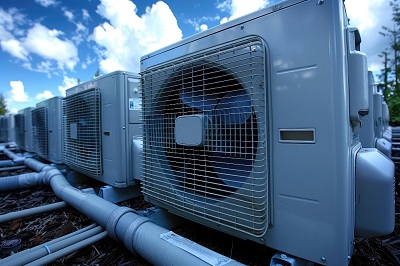When it comes to creating a comfortable living environment, selecting the right HVAC (Heating, Ventilation, and Air Conditioning) system is crucial. Your choice will directly impact your home’s energy efficiency, indoor air quality, and overall comfort. With numerous options available on the market, it’s essential to make an informed decision. This comprehensive guide will walk you through everything you need to know to choose the best HVAC system for your home.
Understanding the Basics of HVAC Systems
Before diving into the specifics, it’s important to understand the fundamental components and functions of an HVAC system. At its core, an HVAC system regulates the temperature, humidity, and air quality within a building, ensuring a comfortable and healthy indoor environment.
Heating Systems
There are several types of heating systems available, each with its advantages:
- Furnaces: Powered by gas, oil, or electricity, furnaces are a popular choice due to their reliability and efficiency. They work by blowing heated air through ducts to distribute warmth throughout your home.
- Heat Pumps: These systems are highly efficient and can both heat and cool your home. They work by transferring heat from the outside air into your home during the winter and reversing the process in the summer.
- Boilers: Boilers use water to distribute heat through radiators or radiant floor systems. They are particularly effective in colder climates and provide a consistent, comfortable warmth.
Cooling Systems
Cooling systems are essential for maintaining a comfortable temperature during the hot summer months:
- Central Air Conditioners: These systems use a network of ducts to distribute cooled air throughout your home. They are highly effective for larger homes and provide consistent cooling.
- Ductless Mini-Splits: Ideal for homes without ductwork, these systems consist of an outdoor compressor and one or more indoor air-handling units. They are energy-efficient and offer zone-specific cooling.
- Window Units: While not as efficient as central systems, window air conditioners are a cost-effective solution for cooling individual rooms.
Ventilation Systems
Proper ventilation is critical for maintaining indoor air quality. There are several types of ventilation systems to consider:
- Exhaust Fans: These systems remove stale air from specific areas, such as bathrooms and kitchens, improving indoor air quality.
- Energy Recovery Ventilators (ERVs): ERVs exchange stale indoor air with fresh outdoor air while retaining energy, improving overall air quality and energy efficiency.
- Whole-House Ventilation Systems: These systems provide consistent, controlled ventilation throughout your home, ensuring a steady supply of fresh air.
Factors to Consider When Choosing an HVAC System
Choosing the right HVAC system involves more than just selecting a heating or cooling unit. Several factors should influence your decision to ensure you choose a system that meets your needs and budget.
1. Climate Considerations
The climate you live in plays a significant role in determining the type of HVAC system that will work best for your home. For example, if you live in a region with cold winters and hot summers, a heat pump or a combination of a furnace and air conditioner may be ideal. In milder climates, a heat pump might be sufficient for both heating and cooling.
2. Energy Efficiency
Energy efficiency is a critical factor that impacts both your environmental footprint and your utility bills. Look for systems with a high Seasonal Energy Efficiency Ratio (SEER) for cooling and a high Annual Fuel Utilization Efficiency (AFUE) for heating. These ratings indicate how efficiently the system operates, with higher numbers representing greater efficiency.
3. Home Size and Layout
The size and layout of your home will directly impact the type of HVAC system you need. Larger homes typically require more powerful systems, while smaller homes may benefit from more energy-efficient options like ductless mini-splits. Additionally, the number of floors and the home’s design should be considered, as this can affect airflow and temperature distribution.
4. Ductwork Condition
If your home already has ductwork in place, it’s essential to assess its condition before installing a new HVAC system. Leaky or poorly insulated ducts can significantly reduce the system’s efficiency. In some cases, repairing or upgrading ductwork may be necessary to ensure optimal performance.
5. Indoor Air Quality Needs
If you or your family members suffer from allergies, asthma, or other respiratory conditions, indoor air quality should be a top priority. Consider systems that offer advanced filtration options, such as HEPA filters or UV air purifiers, to remove allergens, bacteria, and other contaminants from the air.
6. Budget Constraints
While it’s important to choose a system that meets your needs, it’s equally important to stay within your budget. Consider not only the initial cost of the system but also the long-term operating costs. Energy-efficient systems may have a higher upfront cost but can save you money on utility bills over time.
Popular HVAC System Options
Now that you understand the key factors to consider, let’s explore some of the most popular HVAC system options available:
1. Split Systems
Split systems are the most common type of HVAC system, consisting of an indoor unit and an outdoor unit. The indoor unit is typically located in a central location, such as a basement or attic, and the outdoor unit is placed outside the home. Split systems offer a balance of efficiency and performance, making them a popular choice for many homeowners.
2. Hybrid Heat Pump Systems
Hybrid heat pump systems combine the efficiency of a heat pump with the reliability of a furnace. These systems automatically switch between the heat pump and furnace, depending on the outdoor temperature, to provide optimal comfort and efficiency year-round.
3. Ductless Mini-Split Systems
As mentioned earlier, ductless mini-split systems are ideal for homes without existing ductwork. They offer zone-specific heating and cooling, allowing you to control the temperature in individual rooms. This can lead to significant energy savings, as you can avoid heating or cooling unoccupied areas of your home.
4. Packaged Systems
Packaged systems combine all components into a single outdoor unit, making them a compact solution for homes with limited indoor space. These systems are available in various configurations, including all-electric and gas-electric combinations, to suit different needs and preferences.
5. Geothermal Heat Pumps
Geothermal heat pumps are among the most energy-efficient HVAC options available. These systems use the stable temperature of the earth to heat and cool your home, resulting in lower energy bills and a reduced environmental impact. While the initial installation cost is higher, the long-term savings can be substantial.
Tips for Maximizing Your HVAC System’s Efficiency
Choosing the right HVAC system is just the first step. To get the most out of your investment, follow these tips to maximize efficiency and extend the lifespan of your system:
- Regular Maintenance: Schedule annual maintenance for your HVAC system, including cleaning, inspection, and any necessary repairs. This helps prevent breakdowns and ensures the system operates at peak efficiency.
- Change Filters Regularly: Dirty filters can restrict airflow, forcing your HVAC system to work harder and reducing its efficiency. Replace filters every 1-3 months, depending on the type of filter and your indoor air quality needs.
- Seal and Insulate Ductwork: Ensure your ductwork is properly sealed and insulated to prevent energy loss. This can significantly improve your system’s efficiency and reduce energy bills.
- Use a Programmable Thermostat: A programmable thermostat allows you to set temperature schedules based on your daily routine, reducing energy consumption when you’re not home or during sleeping hours.
- Upgrade to Energy-Efficient Windows: Poorly insulated windows can lead to significant energy loss. Consider upgrading to energy-efficient windows to complement your HVAC system and further reduce energy costs.
Conclusion
Selecting the right HVAC system for your home is a decision that requires careful consideration of various factors, including climate, energy efficiency, home size, and budget. By understanding your options and the specific needs of your home, you can choose a system that provides optimal comfort, energy savings, and long-term reliability.





